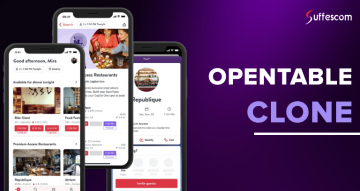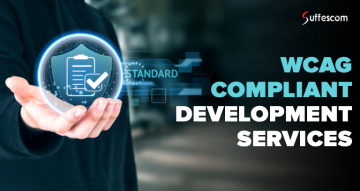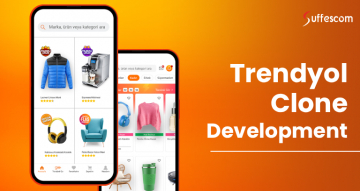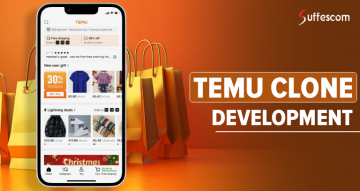Blockchain Identity Management Solutions: Complete Guide 2025

From 3 billion accounts on Yahoo comprised in 2013 to data of more than 530 million Facebook users being exposed to the public internet, massive data breaches have become too familiar. The severity and frequency of these attacks have shown that today's identity management system is unreliable and calls for a better-updated data security solution.
Several companies are pursuing blockchain technology for identity management to ensure the security of digital identities. Blockchain identity management systems are decentralized systems where sensitive data or user information is stored in a secured ledger. Using blockchain for identity and access management is believed to solve all privacy-related and data violation issues.
If you want to blockchain for identity and access management, we at Suffescom have the expertise to make it happen. Get in touch with our blockchain experts and secure your project or business's digital identities today.
In this article, learn about blockchain document verification system and how it is implemented in identity management systems!
Blockchain Identity Management Solution With Experts
Our pool of developers can help you implement blockchain technology in identity management. Our Blockchain Identity Management Solution based on decentralized, tamper-resistant technology with expert oversight, ensuring secure, efficient, and user-centric identity management.
Blockchain Identity Management System Overview
A blockchain identity management system stores the data in a distributed ledger maintained by several computer networks. This makes it impossible for anyone to delete or alter, enabling secure storage and managing digital IDs for enterprises.
In blockchain identity management systems, every user has their unique digital identity linked to a private key. This identity is used to manage and access their personal information.
Why is Blockchain Identity Management System Beneficial?
Blockchain technology can do wonders in addressing problems with traditional identity management systems. Here's how:
Decentralized Control
As blockchain is a decentralized system, no single authority controls the system. The data is stored in a distributed ledger, and each node comprises a copy of a ledger. In this way, the blockchain identity management system becomes more secure and less vulnerable to cyberattacks.
Interoperability
By providing a common platform, various organizations use blockchain technology to enable cross-organizational document and digital identity management systems. In this way, it is easier for users to access resources across various platforms. Moreover, it speeds up business processes.
Better Security
Traditional identity management systems rely on usernames and passwords for security that are too easy to steal and hack. This is not the case with solutions for identity management using blockchain. It uses cryptography to secure data, making it much more difficult for attackers to steal or hack data.
How Do Blockchains Relate To Identity Management?
Today most Identity and Access Management rely on centralized systems, which have less security and are more sensitive to data attacks. This puts the identities and data of millions of people at risk. Blockchain helps to resolve such issues by decentralizing the IAM system and creating decentralized identifiers (DIDs).
Decentralized Identifiers (DIDs) are globally unique identifiers created from strings of letters and numbers stored and managed in a digital wallet. Each DID protect with a private key known only to the owner. One owner can have many DIDs, limiting the extent to which hackers can trace them. For instance, one person with a DID in the gaming platform can have an entirely different DID on a credit reporting platform.
Each DID links with the credentials issued by the other DIDs. This is attested to unique characteristics such as location, diplomas, payslips, age, etc. The users cryptographically sign these credentials, allowing them to store their DIDs credentials themselves without relying on a single profile provider (Facebook, Google, etc.).
Blockchain Document Verification System Includes The Following Technical Elements
Identity Wallet
An app that enables users to create their own decentralized identity.
Identity Owner
The person who created their identity on the identity wallet.
Issuer/Verifier
A user who verifies and issues the identity information by signing the transaction with a private key.
DID (Decentralized Identifier)
A unique identifier comprising the details of the users, such as service endpoints, certification information, private key, etc.
Explore The Benefits of Blockchain Document Verification System
Benefits Of Blockchain Identity Management System
Blockchain identity management is becoming more of a necessity than a privilege when securing data and identities. Here's how it is beneficial to organizations and users:
Self Sovereign Identity (SSI)
The recent Facebook scandal has shown how technological giants cannot secure users' data and identities. The data are more sensitive to being stolen and hacked by cyber attackers. But by using blockchain for access management solutions, people get the Self-Sovereign Identity that gives users full control over their digital identity. Additionally, other users can access this identity information only when the primary user consents. With SSI, there is no need for a third-party provider; they are permanent, so hackers cannot destroy them.
Ease Of Obtaining Duplicate ID Proof
Most people tend to misplace their ID proofs. Traditionally, retrieving a duplicate ID proof after losing the original involves a complicated process. But with the blockchain digital identity management system, it is easier than ever. It enables tamper-proofing and permanence of records. Tamper-proof nature of records means the data is secure and reliable.
Managing Identity for IoT Systems
IoT enters our lives in multiple ways, such as smart appliances, remote patient monitoring systems, and fitness trackers. Blockchain IoT solutions can collect data and stream it to the service providers. All communications from IoT-enabled devices happen online. This poses a security threat, and if the devices collect sensitive data as protected health information, the users are at a great security risk.
Blockchain identity management system ensures that the data collected by such devices is under the full control of the users only. Identity management using blockchain adds a security layer since these systems have a distributed ledger for device IDs, ensuring the data is secure enough to prevent hackers from accessing their sensitive information.
Reducing Costs
With a blockchain digital identity management system, verifying and authenticating identities is much faster as the application of cryptography guarantees that the data is valid and authentic. There is no need to contact the issuer, as verifiers can instantly check the authenticity of the credentials. This calls for far fewer resources and staff for verification, which helps reduce the organization's overall costs.
Non-Custodial Login Solutions
Traditionally, users must trust third-party providers when logging into internet-based services or signing into employee networks. The service must maintain central servers to keep their credentials secure and safe. These solutions are known as 'Custodial Login Solutions,' Just like any other centralized solutions, they are more vulnerable to hackers and cyber attackers.
A blockchain identity management solution completely changes the scenario by offering decentralized and improved security solutions. It leverages private-public key pairs for login, ensuring more enhanced safety of users' login credentials.
Faster Identity Verification
The user's DID store in the blockchain can be used in various applications. For instance, mandatory KYC requirements for financial institutions, passports, driver's licenses, and other necessary credentials can be linked with their DID.
Once users complete their KYC process, they are issued a VC confirming that their KYC credentials can be used for other verification processes. In this way, companies are not required to conduct a KYC each time, as they can rely on KYC VC.
KYC VC ensures a faster verification process as the verifier can rely on the blockchain identity management system to see the issuer's public cryptographic key and confirm if the ID is genuine or fake. Moreover, there is no need to contact the concerned issuer.
Blockchain Digital Identity Management System Use Cases
Many use cases are implementing blockchain for identity management and potential applications leveraging the benefits of blockchain identity management systems. Let's have a look at some of them:
Blockchain For Access Management In Healthcare
Blockchain for identity and access management in healthcare can ensure the integrity of confidential health records. The implementation of blockchain in healthcare makes it easier for hospitals and pharmaceutical companies to transfer patient information to authorized people safely and securely. Moreover, patients have full control over their health data. They can immediately consent to doctors to access their health records through their phones.
Another way how blockchain for access management systems can be used in healthcare is to help hospitals and other healthcare organizations streamline hiring. It allows them to quickly verify the certifications and experience of the professionals without contacting their previous workplace.
Blockchain Identity Management Solution In Education
The Blockchain use-cases in education sector show that blockchain technology can deliver the maximum impact on the education industry. Schools, Colleges, or Universities can issue ‘Verifiable Credentials’ to every student. Then, the students can create their DIDs, and the linked VC can prove their scholarships, awards, certificates, and academic records. These VCs can be verified by the universities instantly.
Another way it can be used is to verify the work experience of college students. Most students get at least 1 year of work experience to develop relevant and valuable skills related to their field of study. These experiences can be added to their VC by the program and their DID. In this way, students have a lifelong record of their work experience and skill development.
Blockchain Identity Management in Supply Chain Management
Blockchain identity management system creates transparency in supply chain management. The stakeholders in the supply chain can issue a DID with authorization to add data as VC about the product being transported. The VC data accessible to each stakeholder acts as a shared source of data that is almost impossible to have tampered with. Blockchain supply chain solutions add new values to the supply chain regarding lack of interoperability and inconsistent data.
Also, blockchain identity management systems can be used to check product authenticity. Every product can be assigned a DID tracking the status from production to the market. The product information is available on the company's website. All the customers had to do was scan a QR code with their phone, and then they could check if the product was real or a copy.
Get In Touch With Our Experts To Develop a Blockchain Identity Management Software Development
At Suffescom, our team is ready to provide our clients with end-to-end blockchain-based solutions. We hold high-level expertise in blockchain technologies such as EOS, Tron, Ethereum, Hyperledger and more to build highly secure blockchain based platforms.
Why Choose Suffescom To Help You Build a Blockchain Identity Management System For Your Organization?
Blockchain identity management solutions are a wonderful way of keeping sensitive data secure. It stores data in an immutable and decentralized ledger, enabling third parties to validate users' data without wasting money and time.
Building decentralized identity management systems is becoming more crucial than ever. Suffescom has vast custom blockchain development experience and can build document verification systems effortlessly. Our in-house experts have experience in offering our clients the finest blockchain-related services globally. We have much to bring to the table that makes us the right technology partner for your project.
Moreover, we have a 4.9/5 rating on famous platforms such as Clutch and GoodFirms. We have more than 5.5 years of experience in blockchain technology with expertise in Solana, Ethereum, NEO, Hyperledger, TRON, and Solana.
At Suffescom, our experienced developers will guide you through the entire process. Get in touch with our experts today.








